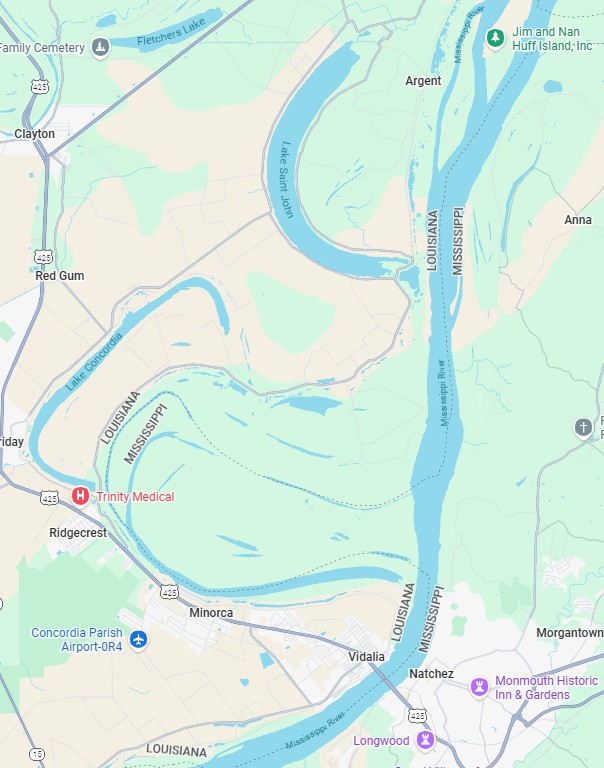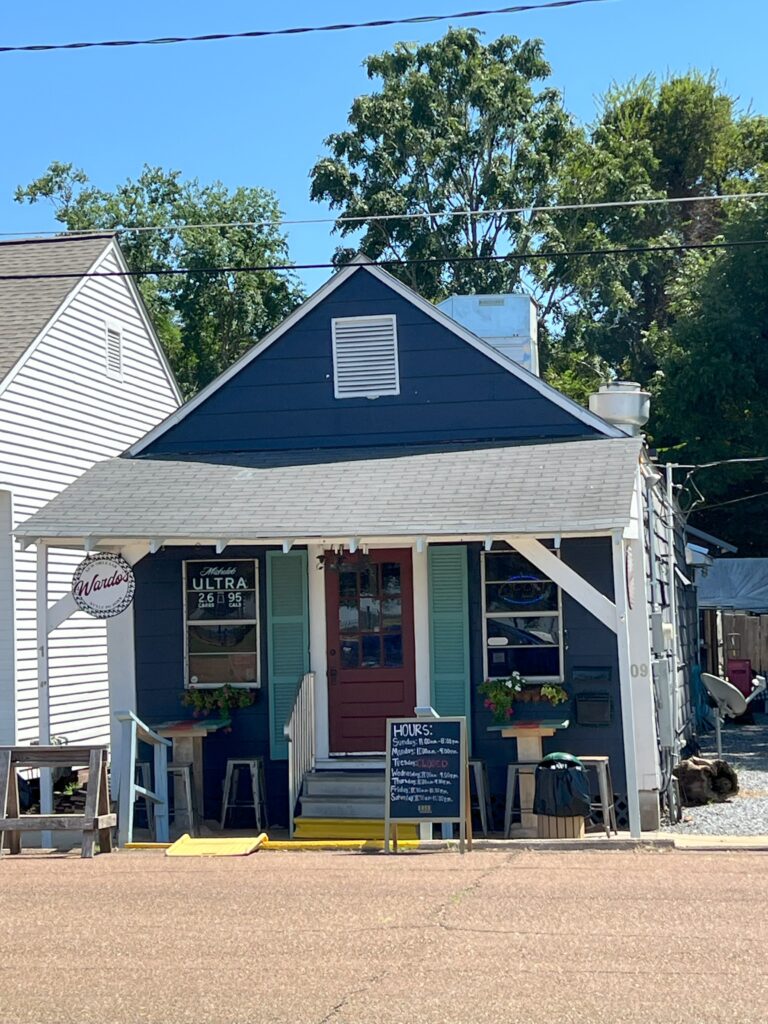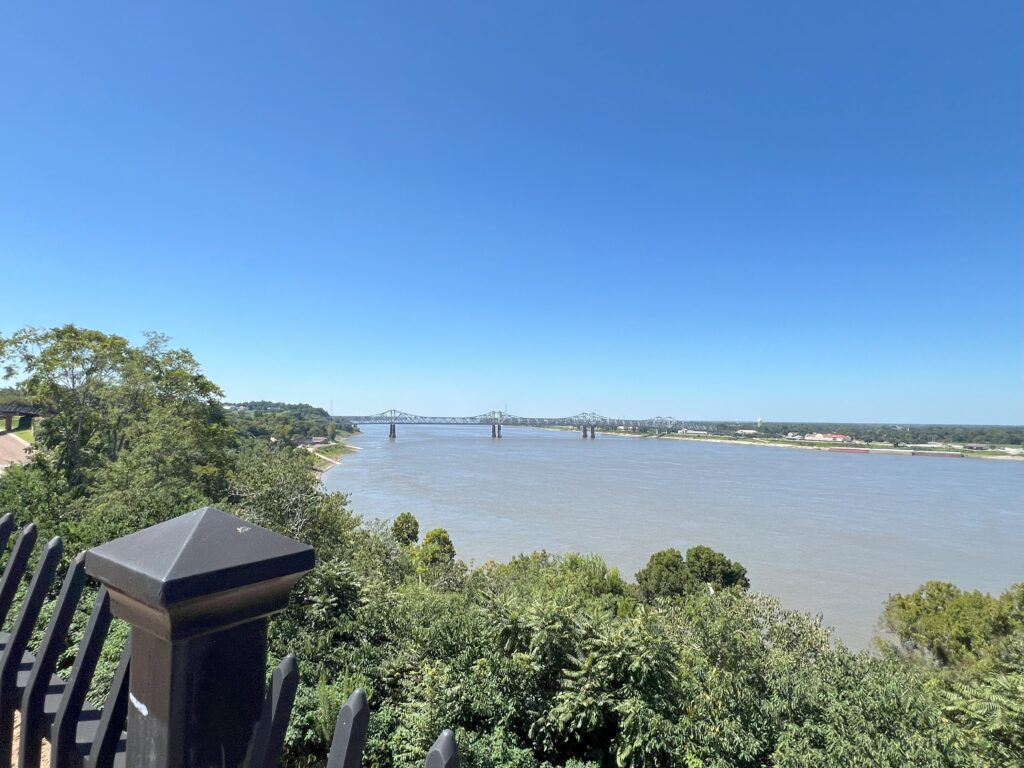We’re driving down Interstate 55 from Memphis, on our way to Natchez. We’ve skipped breakfast at the hotel in favour of the homestyle food at ‘Cracker Barrel’, the Old Country Store on route that we can rely on for a hearty breakfast. Crispy bacon, eggs sunny side up, forget the grits, and we’re fully charged for the 300 mile journey.
After our time in the cities we are looking forward to a couple of nights in a nice country town, especially after we saw the write-up of our hotel – the Monmouth Historic Inn – on the website: “An early 19th-century antebellum mansion set in 26 acres of manicured gardens,…….. expect gracious hospitality, luxury lodging……. with an ambiance reminiscent of a bygone age, the rooms and suites are as perfect as a picture for your stay in Natchez.”
When we arrive we find that some of this is accurate:- the house is certainly ‘antebellum’ – ie pre the civil war, and ‘reminiscent of a bygone age’ – yes, probably, since the carpets are worn and torn, wallpaper peeling off the wall, door handles loose, and gardens neglected. But ‘gracious hospitality’ and ‘luxury lodging’ – no, I don’t think so.
The house was undoubtedly at one time a beautiful mansion but is now being badly neglected – no-one is managing the place with a critical eye on the state of things. I feel a strong urge to go round and tighten the door handles, clean the stairs and the outdoor tables, and do some garden maintenance. I could make quite an impact in just an hour or two. In fact if I took over the management I could then also make a start on the ‘gracious hospitality’ bit.
But I’m getting carried away – I’m just here on holiday for a couple of days.

The saving grace of the place is the restaurant, serving, we discover, the best food to be had in Natchez. We dine well on fried green tomatoes topped with crab meat, breast of duck with wild rice and sauteed spinach, and a proper New York Cheesecake to finish.
The ‘saving grace’ however, doesn’t apply to breakfast the following morning. The waitress is miserable, has attitude, and, without even a ‘good morning’ immediately instructs us to read the menu ‘right to the bottom’. At the bottom of the menu we find the statement about gratuities being welcome. Basically, she’s only here for the tips. I tell her it’s not normal to come to breakfast with a wad of cash and she replies “don’t you tip in your country?”.
Tipping seems to have gone a bit crazy in the US. We used to say that the US was number one for service and so we had some sympathy with the tipping system here. But things have moved on and now tipping seems to have become an expected entitlement – no longer associated with level of service. Anyway, the breakfast waitress didn’t get a tip. Tipping rant over.
How to spend a day in Natchez? We start by driving through the centre of town. It’s a cute-looking country town main street, a perfect place to have a coffee. A similar town pretty much anywhere in Europe would have a nice tea-shop or café with mouth-watering goodies to be had. But we don’t find it here. We’re really starting to miss this element of the holiday. If not the chocolate-box village café, then just a ‘Pret-a-manger’ or a ‘Pauls’ or even a ‘Starbucks’ would do. But it’s not here.

We decide to see some of the countryside. I’ve noticed from Google maps, as a bit of a geography nerd, that this is perfect Oxbow lake territory. There’s even Oxbows within Oxbows, so we drive across the Mississippi to see. But it seems that this is another Natchez ambition that is thwarted for us: – the lakes are either all too far from the roads and hidden by trees, or, where we do get close, access is only for the private houses built along the lakeside. So it’s back to Natchez to search for anywhere that could sell us some lunch.
There’s only one place – a hut by the Mississippi where we buy a couple of Po’ Boy sandwiches and we are left feeling like Po’ Boys ourselves.

After lunch we go for a stroll along the banks of the river and meet a friendly guy who seems to be something of a local historian. We get a free talk on the ‘Relocation of the Mississippi river’. He tells us that Natchez, the town, used to be right where we are currently looking – in the middle of the Mississippi. But in 1927 there was the most destructive river flood in the history of the United States. About 500 people died and over 630,000 people were directly affected. Following this the decision was taken to change the course of the river right through where Natchez used to be. The river flooded the town, and the town was moved to its current site.

When we were driving down from Memphis it became clear that we were increasingly entering the Bible Belt, and now we are firmly in it. There’s a Baptist Church every minute or two as we drive along – it can’t be correct but it seems like there are more churches than houses. And, from the size and look of them, they’ve got much of the local wealth too.
This evening we get talking to a couple from Yorkshire who for some reason swapped Barnsley for Mississippi, and now live here permanently. They tell us that alcohol is banned in parts of Mississippi and that it’s illegal to take alcohol across the State border. They tell us that round here people don’t ask if you go to church, they ask which church you go to. They were recently asked by some young men which church they go to. ‘We’re from England….” they replied.”…we’re heathen”. “Oh, we don’t know that one” was the response from the young men.
It’s our last night in Natchez. Margaret is kept awake by scratching at the door. Checking out the next morning the receptionist says “Ah, you were in the haunted room, did you get a visit in the night?”
We think that next time we’ll probably by-pass Natchez and drive straight to New Orleans.